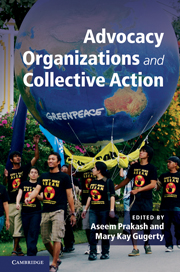Book contents
- Frontmatter
- Contents
- Figures and tables
- Contributors
- Preface
- Acknowledgments
- 1 Advocacy organizations and collective action
- Part 1 The institutional environment and advocacy organizations
- Part 2 Advocacy tactics and strategies
- 5 The market for human rights
- 6 Brand identity and the tactical repertoires of advocacy organizations
- 7 Shopping around
- Part 3 International advocacy and market structures
- Part 4 Toward a new research program
- Index
- References
7 - Shopping around
environmental organizations and the search for policy venues
Published online by Cambridge University Press: 05 June 2012
- Frontmatter
- Contents
- Figures and tables
- Contributors
- Preface
- Acknowledgments
- 1 Advocacy organizations and collective action
- Part 1 The institutional environment and advocacy organizations
- Part 2 Advocacy tactics and strategies
- 5 The market for human rights
- 6 Brand identity and the tactical repertoires of advocacy organizations
- 7 Shopping around
- Part 3 International advocacy and market structures
- Part 4 Toward a new research program
- Index
- References
Summary
The Atlantic States Legal Foundation (ASLF), an environmental organization located in central New York State, was once the leading non-governmental organization enforcing violations of the Clean Water Act (Atlantic States Legal Foundation, n.d.). Throughout the 1980s and 1990s, Atlantic States pursued a national litigation campaign, working with local environmental groups to sue industries that were out of compliance with their water pollution permits. In Indiana, during one six-week period alone, ASLF filed over one hundred lawsuits (Samuel Sage, personal interview, February 24, 2005). Today, the Atlantic States Legal Foundation uses the courts infrequently; rather, the organization spends most of its time providing technical assistance to groups and individuals with specific environmental concerns. Moreover, the group targets environmental problems beyond the local or even the national level. One of ASLF’s more recent campaigns, for example, focuses on environmental issues in Eastern Europe, particularly pollution of the Black Sea watershed.
The organizational evolution of the Atlantic States Legal Foundation illustrates one of the key strategic questions faced by environmental organizations – and, in fact, by all advocacy organizations – and that is where to press their policy claims. The US political system provides organized interests with a wide array of policy venues, from county councils, to state legislatures, to district courts, to federal agencies. And the increasingly international scope of environmental politics opens up an even wider set of policy arenas from which to choose. When public policymaking becomes a multilevel, multi-arena game, how do groups select one policy arena over another? Why do advocacy organizations occasionally abandon their chosen venue and move to an alternative one? What, in other words, shapes the strategies of advocacy organizations when it comes to choosing a policy venue in which to exploit conflict?
- Type
- Chapter
- Information
- Advocacy Organizations and Collective Action , pp. 177 - 202Publisher: Cambridge University PressPrint publication year: 2010
References
- 8
- Cited by



